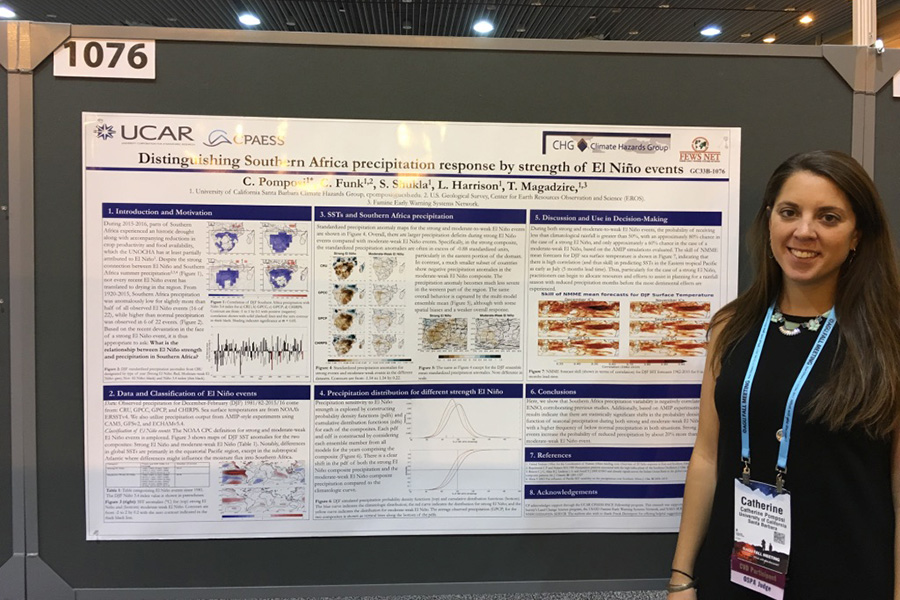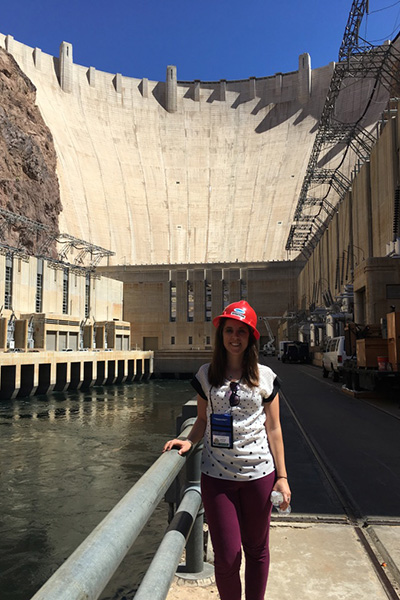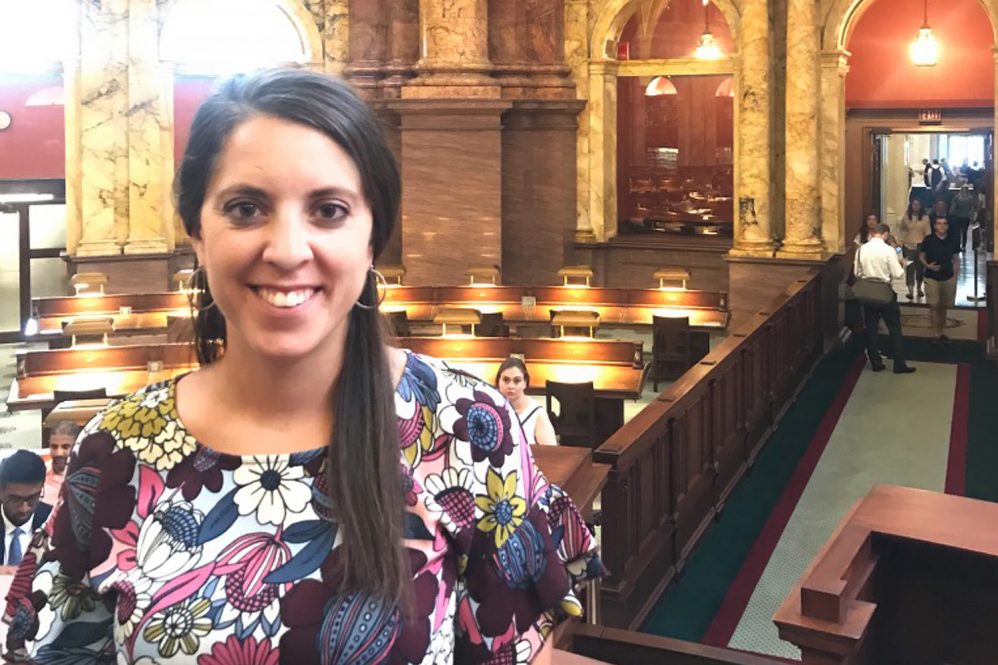Catherine Pomposi ’10 (CLAS) graduated from the College of Liberal Arts and Sciences with a degree in statistics and environmental analysis. She earned a Ph.D. in climate science from Columbia University; was a Postdoctoral Research Scientist at UC Santa Barbara; and served as a legislative fellow in the office of U.S. Senator Kamala Harris. In 2019, she joined the U.S. Agency for International Development (USAID), where she is currently a Climate Monitoring and Evaluation Advisor. Pomposi explains how her time at UConn helped shape her career.
The views and opinions expressed in this interview are solely those of Catherine Pomposi and not necessarily the views and opinions of the United States Agency for International Development or other employers.
What inspired you to pursue statistics and environmental science?
I was actually a transfer student to UConn. I liked statistics, so I transferred into the statistics program. Sophomore year, I realized that many people in that program were going into business and actuarial science. I personally wasn’t interested in that career path and I wanted to stay with the major, I just wasn’t sure where it would lead me.
During the same year, I happened to take a general education class, Introduction to Physical Geography. I absolutely fell in love with thinking about the way that climate, places, and people are all interconnected. I had a fabulous professor, Anji Seth, and I wanted to do more with climate and environmental issues. I started developing an individualized major with Professor Seth in environmental analysis, seeking her guidance on career paths and research opportunities. [The individualized major] allowed me to take climate, environment, and ecology classes, but also tie in some of my statistics background.
How did your CLAS degree prepare you for your work after UConn?
It feels like because I was first inspired at UConn to pursue climate science that I’ve ended up where I am now. So much of the research I did as a graduate student built on aspects of quantitative methods, statistical analysis, and climate science that I started to develop as an undergrad. That direct line from UConn to my graduate program and later to my postdoctoral fellowship allowed for me to become steeped in climate science issues. At the same time, my interest in working at the nexus of science and policy was growing stronger and led me to apply for the American Association for the Advancement of Science (AAAS), Science and Technology Policy Fellowship (STPF) program. It’s a program that brings trained scientists and engineers into federal government positions to use their quantitative, scientific, and analytical backgrounds in policy spaces.

You were a legislative fellow for then-Senator Kamala Harris. What was that like and what did you work on?
When the Vice President was a Senator from California, I worked in her office through the AAAS STPF program. I served as a member of her climate, environment, and energy team, working primarily on water resources management. I contributed to new legislation and provided broad support on climate adaptation and resilience priorities. For example, [I worked on] a bill that would make shorelines more climate resilient by using materials that are found in nature to buffer coastlines from sea level rise or damage from large storm events.
Serving on the Hill was by far the most dynamic workplace I have ever been a part of. Things are constantly changing, sometimes throughout a single day. The experience of seeing how science can inform policy, but serves as only one piece of the process, makes me better at understanding the environment that I’m working in now. I’m honored and humbled to have had the opportunity to utilize my scientific background in a different context to address complex policy challenges.
What advice would you give to students and alumni who have similar career aspirations?
Keep being curious and trying new things. Say yes a lot, but definitely have boundaries. The 24/7 work culture can sometimes be very difficult to combat. But, in remaining open to new experiences, I have found that I am never bored with my work. I’ve met and worked with many different people who are great colleagues, passionate about what they do, and hopeful in the ability to apply science and policy to make the future a little brighter for everyone.

I’ve been able to travel, experience different cultures, and work in different sectors, opening my eyes to so many new things. I’ve only had this rich career path because I’ve taken steps and not necessarily known where I’d end up. It is scary when you’re at the starting point. I combat this unease by relying on the words of mentors and colleagues, who remind me that at the end of a career you’ll look back and the pieces will make a lot more sense. This has given me the confidence to keep moving forward even when the path seems unclear.
What’s the most valuable skill you learned from your time at UConn?
It was the first place that challenged me to think critically. Even now, thinking critically through a problem – trying to see it from many different perspectives and analyzing things like a scientist – is something that I bring to the workplace and continues to serve me well. UConn was a place where I started to question things, experience new lines of thought, recognize and appreciate different cultures, and broaden my perspective. I always felt encouraged to do so. I’m more and more grateful for my time in such an open and trusting community.
You were recently tapped to moderate a UConn event on climate change. What motivates you to stay active as an alum?
Without UConn, I don’t know if I would have had my career experiences thus far. There’s an aspect of giving back that’s important to me personally, to feel like I’m doing whatever I can to help inspire the next generation or open doors and support others professionally. I also enjoy doing communication and outreach events with diverse groups of people, including those who aren’t as steeped in climate science as I am. I think that a really important piece of creating and sustaining change is educating people, developing connections, and finding shared purpose and meaning. I hope that I can continue these efforts broadly with the UConn student and alumni community.



